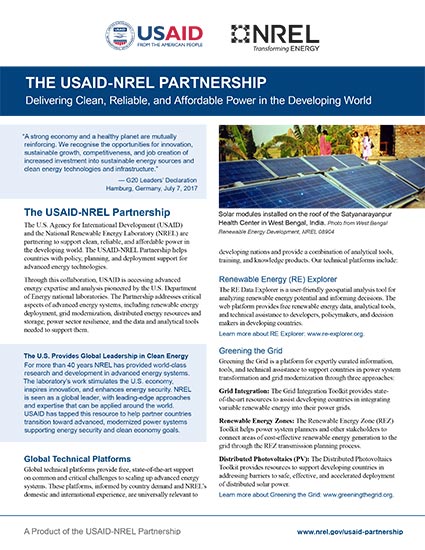- Energy Home
- How We Work
- Programs & Initiatives
- EmPOWERing Women and Girls
- Competitive Energy Procurement
- Toolkits
- Monitoring & Evaluation
- Resources
- Stories
Speeches Shim
Industry experts identify investment barriers in developing country energy sectors and discuss how donor funding can help overcome them.
Private sector engagement is fundamental to USAID’s goal of ending the need for foreign assistance. As one of the most-powerful forces for improving lives, strengthening communities, and accelerating countries towards self-reliance, private-sector engagement—and the market-based approaches it leverages—builds the skills, resources, knowledge, local institutions, and incentives that enable local systems and markets to be self-sustaining long after USAID support has ended.
In order to better apply these principles to developing country energy sectors, USAID and the U.S. Department of Energy’s (DOE’s) National Renewable Energy Laboratory (NREL) have reached out to private sector experts to better understand the barriers to private investment in developing country energy sectors.
Utility Scale Wind and Solar in Emerging Markets
An expert panel of private sector developers and investors discuss how to unlock the growing utility scale wind and solar market in the developing world.
The IEA’s World Energy Investment Report 2018 notes a decline in global energy investment for the third consecutive year, with the largest share of energy sector investments in the electricity sector. Although it declined, investment in renewable power, at nearly USD 300 billion, accounted for two-thirds of power generation investment that year. More investment is needed to meet energy security and environmental goals while supportive renewable energy policies and incentives are helping to drive private sector investment in renewable electricity generation.
Scaling Up Energy Efficiency Investment in Emerging Markets
An expert panel of developers and investors from the private sector discuss how to unlock the growing energy efficiency market in the developing world.
IFC’s Climate Investment reports that global energy efficiency potential is large and growing—governments and business invest more than $300 billion each year to improve the efficiency of power grids, transport, industry, and buildings. To put this into perspective, this is equal to or higher than annual investments in coal, oil, and natural gas power generation. The global green buildings market continues to double in size every three years.
Smart Grid Technology in Emerging Markets
An expert panel of developers and investors from the private sector discuss how to unlock the growing smart grid technology market in the developing world.
Across the globe, energy consumption is increasing, and utilities operating on outdated infrastructure with dwindling resources are struggling to keep up. In many regions, smart grids—the infrastructure that allows real time power delivery monitoring and management from generation to end-use—are emerging as a viable answer to decreasing the burden of projected peak demand. The 2017 Smart Grids Market Report found that smart grids could reduce the projected peak demand by nearly 24 percent across the major regions of the world. But this burgeoning technology still faces barriers to gaining adequate private sector investment.
Mini-Grids in Emerging Markets
An expert panel of developers and investors from the private sector discuss how to unlock the growing mini-grid market in the developing world.
According to the International Energy Association, the number of people without access to electricity fell to 1.1 billion people for the first time in 2016, with nearly 1.2 billion people having gained access since 2000. Though mini-grids are a viable option to continue closing the energy access gap, only 26 million households globally are currently served through off-grid systems. Experts suggest that 40 percent of the world’s installed capacity will have to come from mini-grids to achieve universal electricity access by 2030 and private sector engagement is increasingly critical to scaling up mini-grid investment globally.


Comment
Make a general inquiry or suggest an improvement.